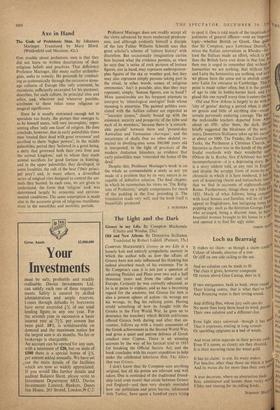The Light and the Dark
COMPTON MACKENZIE'S Greece in my Life is a loosely knit and entirely sympathetic memoir in which the author tells us how the affairs of Greece have not only influenced his thinking but indeed absorbed much of his existence. For in Sir Compton's case it is not just a question of admiring Pericles and Plato over two and a half thousand years and from the other end of Europe. Certainly he was correctly educated, as he is at pains to explain, and so has a becoming regard for the ancients; but Greece for him is also a present sphere of action--its wrongs are his wrongs, its flag his rallying point. Having retold something of how he fought with the Greeks in the First World War, he goes on to denounce the treachery which British politicians offered Greece both during and after that en- counter, follows up with a timely assessment of the Greek achievement in the Second World War, and gives a quiet and patient defence of Greek conduct over Cyprus. There is an amusing account by the way of his farcical trial in 1933 for breaking the Official Secrets Act, and the book concludes with his recent expedition to help make the celebrated television film. The Glory that was Greece.
1 don't know that Sir Compton says anything original, but all his points are relevant and well taken. One is reminded of the traditional friend- ship (and even more) that exists between Greece and England—and then very sharply reminded how our politicians and press barons, infatuated with Turkey, have spent a hundred years trying
to spoil it. One is told much of the ineptitude jealousies of general officers—ever an improvl topic—whether British or Greek. One ga that Sir Compton, pace Lawrence Durrell, mires the Italian renovations in Rhodes—for least the Italians made an effort, which is ire than the British have ever done in that line. A• then one is urged to remember that without humanities we are nothing, that without WI and Latin the humanities are nothing, and so 0: we please have the sense not to abolish conlPt sory Latin for entrance to Cambridge. This II' point is made rather often, but it is the privild: of age to ride its hobby-horses hard, and I .ar plaud this one myself every time it enters the nei, Old and New Athens is largely to do with 09, 'city of genius' during a period when it shoorc'l no genius and little of anything else--excePl certain perversely enduring courage. The last.,' the reckonable teachers departed from Ad', I about Al) 450: after them, the dark. Havii:01.! briefly suggested the bleakness of the next -.‘ years, Demetrios Sicilianos takes up his narrat° at about Al) 1000. The Franks, the Catalans, l; Turks, the Parthenon a Christian Church. s „ literature as there was in the hands of the poesy feudal overlords with their wonderful natil!% (Othon dc la Roche, Sire d'Athencs) but brow; incomprehension--it is a depressing story. Witd is a story seldom told, at any rate in Eng131:0; and despite the scrappy form of name-by-113x chronicle in which it is here rendered, it has sort of despairing charm and melancholy inte171 that we find in accounts of eighteenth-calLli Rome. Furthermore, things cheer up a little afitid 1821. Much of what follows, being collar, with local houses and families, will be of WI appeal to Englishmen, but intriguing items, popping up: such as the historian George Fin1311 who arranged, being a discreet man, to have., beautiful woman brought to his house in a cr and opened it to find her ugly sister. stMON RAs4)


































 Previous page
Previous page